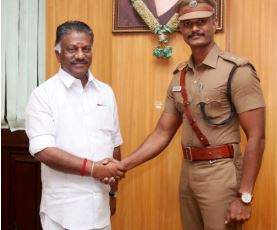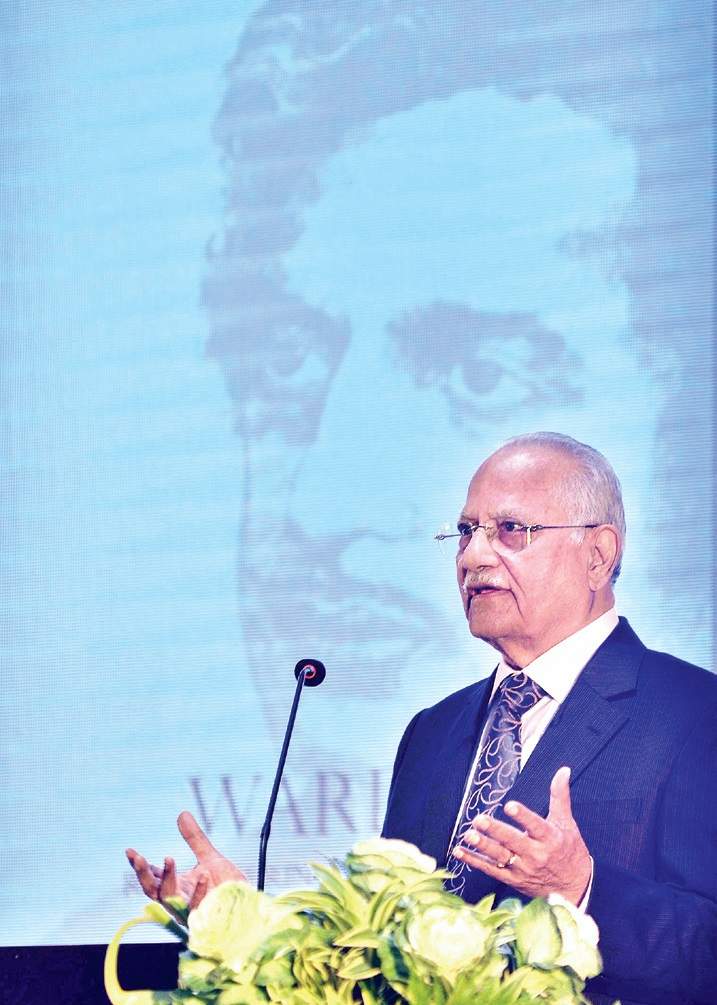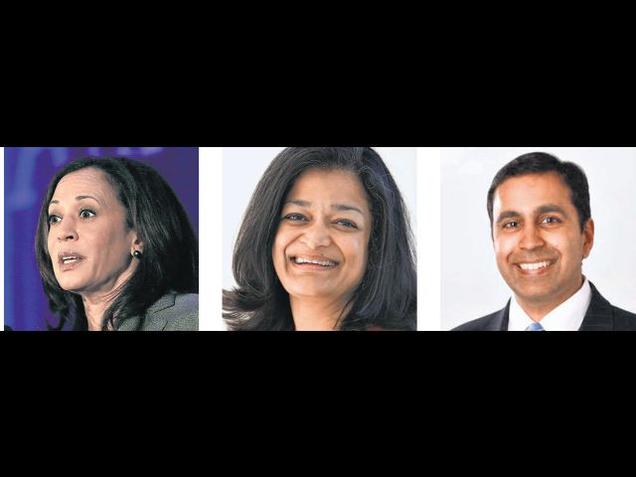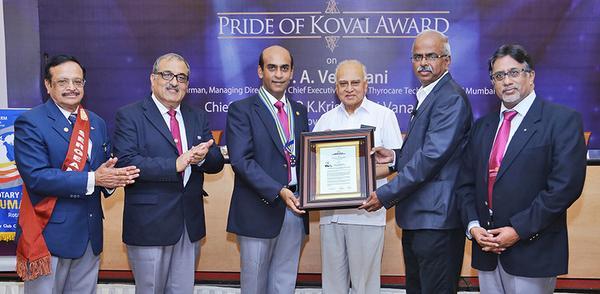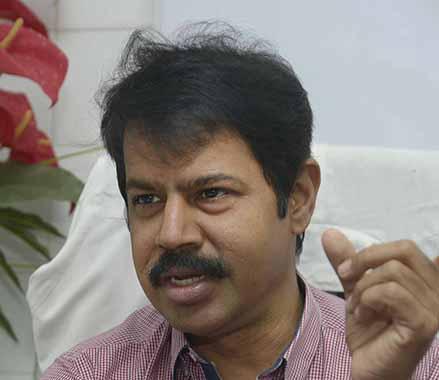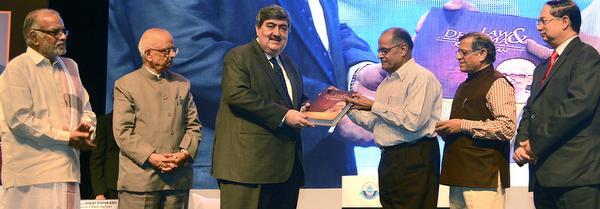Two persons I met several years ago in the course of two projects were in the news earlier this month, one for a sad reason, the other for a happier one. Each deserves to be recalled at some length individually this week.
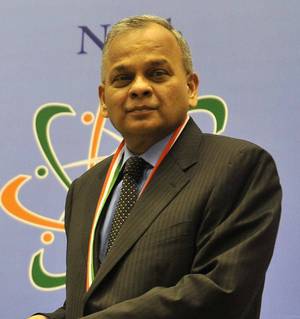
A. Sivasailam, a gentleman of that old British school whose traditions became rooted in the Amalgamations Group that he headed for 40 years – this year, he would have celebrated his 40th year as its Chairman – passed away in one of the places his heart was closest to, the Sringeri Math. It was in the fitness of things that he breathed his last shortly after receiving darshan during a pilgrimage to a shrine he had so much faith in.
A rare civility, an old-fashioned gentility, an uncommon politeness, and a soft-spokeness that, at the numerous fora he addressed, where even mikes at their most powerful were hard put to it to make louder, are what I remember during all the times I met with him when I was writing Getting India on The Move, the story of Simpson’s but to a great extent also the story of what he called ‘A. Limited’.
He would always stand up to greet one when I came in and would always accompany me to the door when I left, in between during the interview enquiring about my father and family. Typical of him was the occasion when the Presidency College ground and pavilion on the Marina, that Simpson’s had renovated, was being inaugurated. He spotted me in a corner and invited me to come up and say a few words on a project which I had long been urging the Group to get involved in.
Two other things I kept suggesting he certainly thought about, but “Let’s see,” was always his answer. One was reviving The Mail for which I wrote in my Colombo days and in the Rajan days after I came to Madras.
The other was setting up an archives accessible to the public with the wealth of material The Mail, Simpson’s and other Group companies have (Simpson’s, for instance, has a wonderful collection of the plans for the coaches it built.). Such a memorial to his father, Anantharamakrishnan, and to Sivasailam would be the fittest one, given his abiding interest in heritage. The Roja Muthiah Research Library, I’m sure, will be only too glad to assist in this.
******
…and his love for agriculture
Everyone speaking of Sivasailam tends to think of him as an industrialist, the person who brought a group with industrial flagships out of its darkest years in the 1960s and 70s when Estate Duty post-1964 almost crippled the Group financially and the worst labour unrest in the State virtually brought production to a standstill. But what struck me most about him was his love for agriculture, something his father, Anantharamakrishnan – J to all – had had. Some of Sivasailam’s happiest hours were spent at J Farm in Pudupakkam, about 50 km from Madras, and Chamraj Estate up in the Nilgiris.
J Farm, a 200-acre property, had its beginnings in the vegetable garden that Marie Buck, the Group’s Welfare Director (an American, she was the widow of Harry Buck who founded the YMCA College of Physical Education), nurtured there while living on the property.
After TAFE was established in 1960, Sivasailam saw the possibilities of how the farm could help the tractor business and by 1964 he had slowly converted the vegetable farm and orchard into a centre for agriculture extension work and a research station. In this capacity, J Farm played a major role in the Green Revolution, particularly amongst Tamil Nadu farmers.
A little-known story is that the farm was largely responsible for allaying farmers’ misconceptions about the high-yielding dwarf ‘Taichung’ rice variety. J Farm did signal service in introducing in Tamil Nadu several high-yielding varieties from this parent stock, particularly J-13 which became popular all over the country. But I wonder how many realise the significance of that J. The Farm later helped in introducing the Filipino strain, IR50, and the Malaysian White Ponni. And it has played an important role in popularising cultivation of pulses and high-yielding groundnut varieties and making mango orchards an alternative to coconut in dry zone conditions. From this to the seeds business was only a hop, step and a jump and that’s what Sivasailam next focused on. No doubt all this was the result of quiet ruminations for a couple of days at a time spent on Chamraj Estate, which he always said was his “idea of a good time”.
On the industrial front, Sivasailam was far-seeing, even though business commentators always called the Group conservative and not taking the risks involved in growing fast. Yet the Group was one of the first in the country to make itself felt in the Russian and East European markets. As far back as 1990 he had told me. “Both will now open up tremendously and there will be a demand in them for anything and everything in manufactured products.” But, he added, for exports to really grow, the home base must be strong; “a major portion of production must be capable of being sold within the country.” As for the automobile industry, he predicted in the same interview that it would grow “tremendously for the next 25 years.”
Sivasailam had much to offer listeners at whatever industrial, management or productivity forum he was addressing. He may have said it softly, but he was very clear about what he wanted to convey – and that was always a firm conviction, something he was absolutely convinced about. Those valuable words of advice are going to be missed by many at many a management conclave.
The overseas Tamil workforce
It was only a few weeks ago (Miscellany, January 3), that I had mentioned in this column that ever since the Pravasi Bharatiya Divas was celebrated by the Government under the sponsorship of the Government of India, these gatherings of Indians from overseas had paid little attention to the late 18th – early 20th Century Madras Presidency migrants to the countries of South and Southeast Asia.
This year’s celebration continued to pay little attention to them but it honoured what might well be for the first time a Tamil from the Presidency settled in the region, Mano Selvanathan, a leading Sri Lankan industrialist. And that, I hope, is a welcome beginning.
Selvanathan’s grandfather, S. Kanapathy Chetty, settled in Colombo and started in the 1920s a petrol service station, still going strong, the last I heard. In the mid-1930s, he got into coconut products and started an oil mill in 1937.
His Sri Krishna Corporation Group – as it is now called – hasn’t looked back since, growth first being generated by his son K. Selvanathan. Today, the third generation, the brothers Mano and Hari Selvanathan, run one of the biggest conglomerates in the island that has in many ways brought them full circle – they own, among things, some of the biggest oil palm plantations in Malaysia and Indonesia.
I knew Mano Selvanathan’s father long before I knew him, but Mano was the one who acted on the then Indian High Commissioner in Sri Lanka’s urging to bring out a pictorial history of the Sri Lankans of Indian origin. Gopalkrishna Gandhi, when he had earlier been High Commissioner in South Africa, had got local leaders of Indian origin to bring out a book, From Cane Field to Freedom, on the South Africans of Indian origin. In the case of the Sri Lankan book, Gandhi and Mano Selvanathan invited me to do the book, no doubt on the basis that I had spent half my life in Ceylon and had been brought up on the subject, my father having been one of the leaders of the people of Indian origin in the island. And so there came out in 2003 The Indo-Lankans – Their 200-year Saga.
Over a million Indians mainly from what is Tamil Nadu today, died in the effort to reach ‘Kandy Seemai’ from the 1790s till the mid 19-Century. But over a million survived to help build Colombo harbour, the island’s roads and railways, and create and then tend Ceylon’s plantation economy that flourished well into the 1970s.
The book was a tribute to that forgotten contribution to making Ceylon/Sri Lanka the prosperous country it was till the decline from the late 1960s. It also did some plain speaking on that contribution – and I was grateful that Mano Selvanathan supported it. That book was perhaps the first to pay attention to that part of the diaspora that India — and its later celebrations of Indians overseas — ignored.
For that contribution alone, little known to many, Mano Selvanathan deserved the recent award.
But now he needs to take it further. I can’t think of a better person to lead a move to build a memorial in Madras harbour to the millions from South India, mainly from today’s Tamil Nadu, who went to South and Southeast Asia to toil in the harshest of conditions in those countries, help develop them, still face innumerable difficulties in them, and yet remain the forgotten part of the Indian diaspora. Such a memorial could do much, at least in South India, to wake people up to their kinsmen settled overseas.
source: http://www.thehindu.com / The Hindu / Home> Madras Miscellany> Arts / by S. Muthiah / January 23rd, 2011
